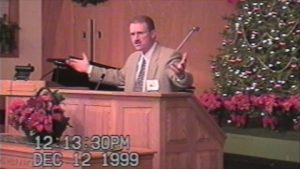 Last month I stumbled upon some sad and difficult news, the likes of which I will not describe in detail, but will only say that it involves a church in the northern Midwest. I heard about this news via a Christian podcast which aired shortly after the crisis in question. When I heard this news, I couldn’t help but to recall to mind several memories concerning one of the most difficult experiences that I have gone through in the ministry. The memories and experiences that I will share will be nameless recollections from the past. To be frank they are difficult memories and past anxieties that I have entrusted to God, lest my own heart be corrupted with a root of bitterness. Yet, these distant memories also bear forth a bounty of important life lessons. Whenever I do think of them, I am immediately drawn to the reflection of God’s kind and faithful tutelage of my soul. Thus, these memories supply helpful goads and warnings as I continue to grow as a Christian, a husband, a father and a pastor. This is the way of God’s beautiful providence: the most bitter experiences in life supply an abundance of teaching concerning our great need for Christ; for His wisdom; for His grace; for his love and tender mercies. Therefore, what I share with the reader is given with the design to pass along important life lessons that the Lord continues to teach me as a bankrupt sinner, devoid of wisdom apart from His Word. There may be those who will read what follows and be familiar with the details which lie behind my generic recollections. If this is the experience of the reader, then please know that my only design is to pass along the life lessons that God has ordained for his people – for me; for you; for every member of His church.
Last month I stumbled upon some sad and difficult news, the likes of which I will not describe in detail, but will only say that it involves a church in the northern Midwest. I heard about this news via a Christian podcast which aired shortly after the crisis in question. When I heard this news, I couldn’t help but to recall to mind several memories concerning one of the most difficult experiences that I have gone through in the ministry. The memories and experiences that I will share will be nameless recollections from the past. To be frank they are difficult memories and past anxieties that I have entrusted to God, lest my own heart be corrupted with a root of bitterness. Yet, these distant memories also bear forth a bounty of important life lessons. Whenever I do think of them, I am immediately drawn to the reflection of God’s kind and faithful tutelage of my soul. Thus, these memories supply helpful goads and warnings as I continue to grow as a Christian, a husband, a father and a pastor. This is the way of God’s beautiful providence: the most bitter experiences in life supply an abundance of teaching concerning our great need for Christ; for His wisdom; for His grace; for his love and tender mercies. Therefore, what I share with the reader is given with the design to pass along important life lessons that the Lord continues to teach me as a bankrupt sinner, devoid of wisdom apart from His Word. There may be those who will read what follows and be familiar with the details which lie behind my generic recollections. If this is the experience of the reader, then please know that my only design is to pass along the life lessons that God has ordained for his people – for me; for you; for every member of His church.
When I was in the earliest years of ministry I was serving in a church whose spiritual beginnings came from the hyper-grace teacher: R.B. Thieme. At the time, I was too inexperienced to comprehend what this meant, but I eventually discovered that the seeds planted by this man, and others like him,[1] established problematic roots in the church – and those roots ran very deep. To varying degrees, men like Thieme champion a notion of grace which maligns the precious truths of the Lord’s sovereignty, mankind’s total depravity, God’s irresistible grace, His unconditional election, particular redemption, and most notably – the doctrine of the perseverance of the Saints. Along with these problematic influences in the church, there was a strong thread of “Evangelical Feminism” – a pernicious doctrine that continues to grow with unmitigated acceleration within the professing world of Evangelicalism.[2] Now I should note at this point that, after being a pastor for over 20 years, I would never enter into such an environment like this again. However, as a young pastor, energetic, optimistic, and naïve, it was my desire to teach the word with the hope that many could be persuaded by the clarity of God’s word on these important matters. Yet, in this first pastorate of mine, I began to discover some of the stark realities of pastoral ministry. What I soon discovered is that individuals who disagree with a church’s leadership will soon reveal their true character, for better or for worse. The number of conflicts that I had to face during this season of ministry are too numerous to articulate here, but in just one example I recall having to travel to California with my wife and young children in order to perform my first funeral service in my life – for my father. My wife had just had a miscarriage and so our family was having to face the reality of death in many different ways. The most difficult aspect of the funeral services that I had to perform for my father centered on the fact that he never made a profession of faith in Christ. Not only did I oversee his funeral, but I had to attend to the affairs of his dwindled estate. All of this proved to be exhausting for all of us as a family, both physically and emotionally.
Upon our return home, I was welcomed with a petition demanding my resignation, signed by several devotees of hyper-grace teaching.
Experiences like these can be crushing, especially to a young pastor; however, in God’s good providence these difficult years began to teach me, in a strange and inverted way, the importance of my role as a shepherd in my home first, for an essential reason: every trial that a pastor faces should bring him back to an inspection of his soul, his dealings with his family, and his dealings with the church – in that order. I began to realize that how I responded to these trials before God and men had the potential of blessing or burdening my wife and children. In fact, I should say that any trial has a way of reminding any man why it is that he needs to be a strong leader in his home as a means of protection from all external conflicts from the world and even the church. For this, I am thankful for God’s sweet providences, though they seemed quite bitter at the time. For five and a half years the Lord delivered a steady stream of such experiences as we navigated our way through various conflicts involving theology proper, harmartiology, soteriology, ecclesiology, the institution of marriage, the family, and the roles of men and women. Every conflict that I had to face brought me to my knees before God, forcing me to reflect on my attitude, conduct, and demeanor before the flock of my household – before any other consideration of my broader ministry to the church. In short, the Lord was teaching me the simple but often overlooked lesson of 1 Timothy 3:1-7:
1 Timothy 3:4–5: 4 He [the overseer – v. 1] must be one who manages his own household well, keeping his children under control with all dignity 5 (but if a man does not know how to manage his own household, how will he take care of the church of God?)…
They say that sometimes big things come in small packages, and with this very thought I would suggest that one of the biggest lessons of 1 Timothy 3:1-7 is packaged within Paul’s parenthetical comment: (“…but if a man does not know how to manage his own household, how will he take care of the church of God?”). I believe that Paul’s lesson on the overseer’s home supplies an important nucleus for all that surrounds it. You see, a man’s singular devotion to his wife, his temperance, prudence, respectability, hospitality, ability to teach, sobriety, self-control, gentleness, peacefulness, and monetary self-restraint are best tested and seen within the crucible of the home before they are tested and seen anywhere else. God does not call shepherds to role-playing or stage-acting; He calls them to the substance of godly leadership in the home as the unimpeachable evidence of his qualifications to lead in Christ’s church. Because of this, the family should be seen as the veritable canary in the coalmine, signifying either the spiritual health or illness of the man who fills the office of overseer. What I began to discover amidst these early trials of my ministry is that the Lord was refining me in ways that I could never have before imagined.
This is the stuff of refinement that no Seminary degree can impart.
It is for this reason that I fully believe that genuine overseers are not created by manmade programs, rather, it is God who sovereignly calls overseers to such an office such that their conduct and character will become evident within a watching church – in God’s time. Such a process as this reminds God’s people that it is God who builds His church, not men, and that the overseer who is truly called by God will be in public what he is in the private. The following 6 principles began to crystalize for me:
1. The Principal Focus of a Pastor’s Leadership: Paul tells us that a genuine overseer must be one who manages his own household [ἰδίου οἴκου] well. This statement points to the principal focus of the overseer – his own [ἰδίου] household. Thus, before an overseer can shepherd other households within the church, his own household must be his first ministry above all. Should he fail here, he fails everywhere. As already stated, his family is the veritable canary in the coalmine signifying either the spiritual health or illness of the pastor.
2. The Nature of His Leadership: Paul reminds us that the overseer/pastor is one who manages his household well. The word manage [προϊστάμενον] literally means “standing before others,” denoting a clear and decisive leadership/management. This concept is important and harmonizes well with Ephesians 5:23, where all husbands are commanded to lead their households because the husband is the “head of the wife, as Christ also is the head of the church.” Taken together, these verses obliterate the contemporary mythology of co-leadership between husbands and wives in the home. Many churches actually believe and teach such co-leadership in the present day, however, biblically speaking, the wife is the helper to her husband according to the creation ordinance (Genesis 2:18), but not a co-leader (Ephesians 5:22-6:4, 1 Timothy 2:9-15). Decades of feminism in the world have influenced the modern church in such a way that these principles are nearly lost – to the demise of many. However, a man who loves his wife is the one who, in the imitation of Christ, will supply a decisive leadership which provides a haven of protection for her and the children. As an example of this principle of loving leadership, God’s covenant of grace with Abraham reveals an important kernel of truth: “For I have chosen him, so that he may command [H. yatzawe] his children and his household after him to keep the way of the LORD by doing righteousness and justice, so that the LORD may bring upon Abraham what He has spoken about him.” Genesis 18:19. This verb, command – yatzawe/tzawa comes from the root word mitzwa (commandment) and is correctly translated as “command” in the NASB. Whatever else the reader might think or assume about the nature of Abraham’s calling of leadership, it was rooted in a clear and decisive management based upon the “way of the Lord.” Abraham was not called to delegate this responsibility to others; nor was he allowed to neglect it or even share it with his wife Sarah; instead, it was Abraham’s responsibility before God alone. In the end, if a man does not lead his household in this manner, he is not qualified to shepherd the flock of God.
3. His Pedagogy in the Home: According to Scripture, a godly husband must seek the sanctification of his wife (Ephesians 5:25-33) and his children (Ephesians 6:4) by means of the ministry of the word. This principle establishes the importance of regular worship in the home (i.e., family devotions/worship). However, spiritual indifference leads men to the neglect of such duties, but love for Christ drives a man to such privileges with great joy. In homes where such a pedagogy of love takes place, one will find the fruit of peace and joy. However, wherever such a pedagogy is weak or absent, uncertainty, sorrow, fear, depression, anxiety, discontentment, provocation, and anger will fester and grow. The overseer must manifest this important duty of family worship for the sake of his own household as well as for the sake of other men who watch his example. As Thomas Manton has said: “A family is the seminary of church and state; and if children be not well principled there, all miscarrieth: a fault in the first concoction is not mended in the second; if youth be bred ill in the family, they prove ill in church and commonwealth. By family discipline, officers are trained up for the Church, (1 Timothy 3:4). Upon all these considerations how careful should ministers and parents be to train up young ones whilst they are yet pliable, and, like wax, capable of any form and impression in the knowledge and fear of God.” Simply put, a man is not “apt to teach” if he is not leading and teaching his wife and children in the home first and foremost.
4. The Importance of Hospitality: Paul’s mention of hospitality in 1 Timothy 3:2 isn’t a quaint notion of social etiquette, but has to do with the quality of loving those who are outside of his household. Such a ministry reveals his care for, and generosity with, others in his broader community. However, hospitality is also important because it supplies a means by which the shepherd can interact with, and be visible before, others within the church. Paul’s instruction about hospitality should bring to mind Peter’s important command in 1 Peter 5:2-3: “[shepherd the flock of God among you…] nor yet as lording it over those allotted to your charge, but proving to be examples to the flock.” The words, proving to be examples [τύποι γινόμενοι], speak of the overseer’s perpetual transformation[3] as seen and witnessed by the people. Thus, a pastor is not a fixed, motionless statue, but is a living, breathing human being who is being transformed by the power of God’s grace such that his life is one that is becoming a greater example to the people who watch him. Despite his flaws as a human being, he, his wife, and children are all growing in wisdom and grace – and the open act of hospitality avails such progress to a church that is called to emulate such an example. Again, hospitality is more than social etiquette – it is the ministry through which sheep can see their shepherd and his family in a very real way.
5. The Centrality of Love: Interestingly, 1 Timothy 3:1-7 is devoid of any explicit mention of love; however, the notion of love is implicitly revealed in every qualification. First, I say this because, as the foremost commandment is indeed foremost in every dimension of life (Deuteronomy 6:4-5, Mark 12:28-31), so it is with every qualification disclosed for the overseer seeing that love must govern everything in the pastor’s relationship with God and men. Second, a careful perusal of 1 Corinthians 13:1-7 reveals that most of the character qualities of the overseer are repeated in this quintessential section on love. Moreover, the overseer’s leadership in his home must reflect that of Christ’s loving leadership of the church: “Husbands, love your wives, just as Christ also loved the church and gave Himself up for her…” (Ephesians 5:25). An overseer’s loving devotion and fidelity towards his wife formulates the basis for his capacity to lead his household well, and all of this establishes the requisite foundation of his leadership of Christ’s church, for “if a man does not know how to manage his own household, how will he take care of the church of God?” Though an explicit mention of love is nowhere to be found in the text of 1 Timothy 3:1-7, it is everywhere by means of the whole counsel of God’s word and is central to everything.
6. The Extent of these Qualifications: As a final point of observation, Paul’s list of qualifications for overseers in 1 Timothy 3:1-7 is to be applied to all overseers – without exception. Though this may seem to be too simplistic an observation for our discussion, it is not. From the beginning of my ministry to the present, I have often encountered a kind of culture of relativity within the church, especially as it relates to elder qualifications. Within such a culture, “staff” pastors are expected to conform to the standards for overseers (at best), while “non-staff” pastors can shirk such standards at will. Such thinking is both unsupportable and disturbing. Though it is recognized that those elders who are primarily focused on public preaching and teaching are to be mindful of James’ warnings concerning teachers (James 3:1), such a notion in no way mitigates the biblical qualifications for “non-staff” elders. Elders who frequent the pulpit as well as those who do not should all be invested in pursuing the elder qualifications stipulated in 1 Timothy 3:1-7, Titus 1:5-9, and 1 Peter 5:1-4 – because none of these texts establish any distinction among those who teach frequently versus those who teach with less frequency. The standards for overseers are not just for those with a seminary degree, or for those who readily fill the pulpit, but they apply to all who bear the title and office of overseer; and a conscientious pastor should seek the application of these standards among all overseers within the church so that he might be surrounded with the kind of accountability that he truly needs for the sake of his life, doctrine, and ministry overall. The removal or avoidance of these standards is spiritually dangerous to the pastor and the entire church.
This is just a small summary of lessons that deeply impacted my life and ministry during these times of testing. Though the pressures around me seemed to be overwhelming at times, the reality was that God was crushing me in order to formulate a valuable faith and conviction that cannot be acquired in the academy. What I did not realize at the time is that these seemingly obvious principles would prove to be deeply controversial. The more I became convinced of the central importance of the overseer’s need to exemplify a godly household in his ministry, the more controversy I faced. Though these principles should not be controversial within Christ’s body, I do maintain that the encroachment of feminism within the visible church supplies a veiled yet virulent opponent to such standards.
So what exactly happened during these trying years of ministry? How does this story end? Well, I won’t divulge all of the details (for there are too many), but the ebb and flow of this season of ministry came to a head when I was eventually accused of having standards for marriage and family that were “too high.” Please note, this was not an accusation of being unbiblical or of failing morally; instead, I was given the cryptic charge of having standards that were too high. At the outset, I was both disturbed and concerned over such charges. The reality is that, should I ever exceed what is written, I would clearly be in the wrong. In such a case as this I would gladly be shown my fault by Scripture, however, this never took place. Instead, I fear that behind these cryptic accusations was the veiled confession:
“We want lower standards.”
I must say to the reader that this is a fearful confession for any church. All of us must recognize that our standards fall short of God’s – daily, but this is to be expected. Isaiah 55:9 reminds us that our ways are exceedingly low, and God’s standards are always higher than ours: “For as the heavens are higher than the earth, So are My ways higher than your ways And My thoughts than your thoughts.” The solution to this is not found in the pursuit of standards that are lower than what God prescribes; instead, we must seek out His high standards in our continual pursuit of growth, knowing that we will never achieve perfection in this life – until the day of Christ Jesus (Phil. 1:6). In the day of His return, we will be like Him and will be brought into conformity with His image. Until then, we are to reach out for God’s high and holy standard until our last breath, knowing that our sanctification in this life is progressive until the end. This is what I must seek as a Christian; as a husband; a father; and an undershepherd, and it is what I should call others to seek for Christ’s sake and ultimate glory. However, I fear that modern Christendom has divested itself of the high standards of God’s word in exchange for a lesser standard. It seems that many today are looking for a pastor who can become the next power broker in the market of “bigger is better”- Christianity. Simple, quiet, faithful devotion to the ministry of the word is out; market-driven big-religion is the new fad. Though Paul commands us to “make it your ambition to lead a quiet life and attend to your own business and work with your hands,” the world scoffs at this as primitive, puritanical, culturally irrelevant and that which will never “trend” on Twitter.
So be it.
As believers we should cherish the priceless robe of “the simplicity and purity of devotion to Christ” (2 Corinthians 11:3), rather than craving the world’s festal garments. Though such worldly clothing is ornate and eye-catching, it never endures. In all of this, I close by thanking the Lord for His precious lessons to me. Within the crucible of these trials, the Lord refined me and led me to understand my need to grow further as a Christian; to grow as a husband; a father; a pastor; and a heavenly citizen within this fallen world. Without the protective safeguards of God’s high standards, I fear that I would fail in the ministry by shrinking back to a lesser standard rooted in my own wisdom and strength rather than His. In God’s good providence it was through these years that I began to preach and write on the subject of marriage and family, which eventually supplied the foundation for my book, The First Institution.[4] As a result of my work on this book, I came to discover that, if anything, my standards needed to be raised further by the truths of God’s word. In all of this, I am deeply thankful to the Lord for His faithful tutelage in my life such that I can look back on such trials and see the tender providence of my faithful Shepherd.
To Him be the glory forever…
[1] Specifically, the most prominent influences within the church came from R.B. Thieme, Zane Hodges, and George Meizinger.
[2] The reader should note that, throughout my ministry I have maintained that feminism is the indirect product of effeminism – that is, men who are unwilling to “act like men” 1 Corinthians 16:13. Wherever men create a vacuum of leadership (in the home or in the church) they create an indirect incentive for women to take their place. Thus, my concern over the prevalence of feminism in the modern era is not about women, primarily, but is centered on the preponderance of men who are failing to lead in the manner that God has called them.
[3] [G. γινόμενοι] – This present middle participle speaks of perpetual transformation of an individual’s nature and character. Perhaps a better translation would be “becoming examples” which clearly denotes the continued, progressive nature of the pastor’s mature as witnessed and imitated by others in the church.
[4] The First Institution: A Theological and Practical Guide for the Reformation of God’s Institution of Marriage and Family [Hardback: ISBN-13: 978-1935358008].
 My dear bride of 28 years recently uncovered some old sermon tapes from my earlier years in pastoral ministry and played several of them. Hearing these old messages from the past has been a strange form of nostalgia, especially in view of the ministerial turbulence that I faced during that time. Yet, the warnings that I then issued, for my own sake and for the sake of the church, remain as a central focus of my life and ministry. Though my homiletical style has changed quite a bit and my presentation has become more seasoned with a serious tone, my core convictions still come through in these older messages. I find that God’s warnings and encouragements in His word continue to sanctify me and my family – a reality for which I am deeply thankful. One message that we listened to was delivered at Woodland Hills Bible Church in Minnetonka Minnesota (now Redeemer Bible Church) where I served as pastor for five years. The text that I addressed is Mark 12:28-31 and my exhortation dealt with the centrality of loving and serving God as the chief priority and purpose of the local church. Many of the same points expressed in this message, concerning the related text of Deuteronomy 6:4-5, are strongly emphasized in my books: Altar to an Unknown Love and All Nations Under God. So, without further delay, here is The Priority and Purpose of the Church – Mark 12:28-31, 1999:
My dear bride of 28 years recently uncovered some old sermon tapes from my earlier years in pastoral ministry and played several of them. Hearing these old messages from the past has been a strange form of nostalgia, especially in view of the ministerial turbulence that I faced during that time. Yet, the warnings that I then issued, for my own sake and for the sake of the church, remain as a central focus of my life and ministry. Though my homiletical style has changed quite a bit and my presentation has become more seasoned with a serious tone, my core convictions still come through in these older messages. I find that God’s warnings and encouragements in His word continue to sanctify me and my family – a reality for which I am deeply thankful. One message that we listened to was delivered at Woodland Hills Bible Church in Minnetonka Minnesota (now Redeemer Bible Church) where I served as pastor for five years. The text that I addressed is Mark 12:28-31 and my exhortation dealt with the centrality of loving and serving God as the chief priority and purpose of the local church. Many of the same points expressed in this message, concerning the related text of Deuteronomy 6:4-5, are strongly emphasized in my books: Altar to an Unknown Love and All Nations Under God. So, without further delay, here is The Priority and Purpose of the Church – Mark 12:28-31, 1999:





 this relativistic, post-modern culture of ours, we should be uniquely careful about this matter of upholding the meanings of such key words. For example, concerning our word in question – friend, we are commanded not to be the friends [philos] of this world (James 4:4). Jesus said: “you are my friends [philoi] if you do what I command you,” and as well, “greater love has no one than this, that one lay down his life for his friends [philon]” (John 13:13). Above any other friendship that we might claim, our friendship (loving affection) with the Lord is the sine qua non of the Christian experience, such that “If anyone does not love (philei) the Lord, he is to be accursed” (1 Cor 16:22).
this relativistic, post-modern culture of ours, we should be uniquely careful about this matter of upholding the meanings of such key words. For example, concerning our word in question – friend, we are commanded not to be the friends [philos] of this world (James 4:4). Jesus said: “you are my friends [philoi] if you do what I command you,” and as well, “greater love has no one than this, that one lay down his life for his friends [philon]” (John 13:13). Above any other friendship that we might claim, our friendship (loving affection) with the Lord is the sine qua non of the Christian experience, such that “If anyone does not love (philei) the Lord, he is to be accursed” (1 Cor 16:22).  The reality is that it is hard enough to know well the people with whom we have direct contact on a regular basis. Christian accountability within the local church is difficult enough as it is, and I would submit that developing genuine friendship relationships is becoming increasingly difficult in time. In reality, e-friendships belie the depth of genuine accountability that we really need, and the folks at Newsweek even understand
The reality is that it is hard enough to know well the people with whom we have direct contact on a regular basis. Christian accountability within the local church is difficult enough as it is, and I would submit that developing genuine friendship relationships is becoming increasingly difficult in time. In reality, e-friendships belie the depth of genuine accountability that we really need, and the folks at Newsweek even understand 
